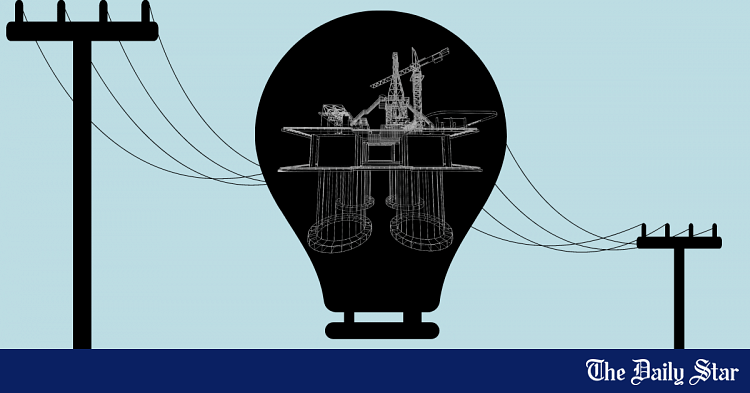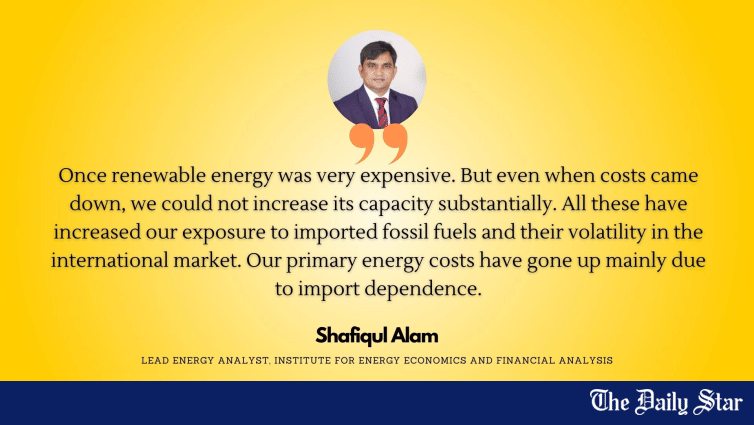Saif
Senior Member
- Joined
- Jan 24, 2024
- Messages
- 16,880
- Likes
- 8,153
- Nation

- Residence

- Axis Group


How can Bangladesh enhance its energy security?
Continuous gas exploration and exploitation of renewable energy should be the two pillars of energy security in the country.
How can Bangladesh enhance its energy security?
A developing country cannot import fuels to sustain a growing economy beyond a certain limit. Bangladesh is no exception. VISUAL: STAR
Bangladesh hasn't recovered from the economic shocks caused by the Covid pandemic and the Russia-Ukraine war, as it is still experiencing a slow but continuous draining of its foreign exchange reserves and is unable to stop the devaluation of taka. The power and energy sectors have been badly impacted in this situation because of their overdependence on imported fuels. Policymakers understood that the foreign currency requirement for this increasing dependency on fuel imports would soon become unsustainable. Experts then pointed out that this situation was mainly the result of neglecting two areas: gas exploration and renewable energy. The stark realisation that the country may not be able to pay for its fuel imports led the authorities and policymakers to declare enhanced gas exploration and incentivise rooftop solar panels and solar parks.
Over the last 20 years, natural gas production in Bangladesh tripled without the addition of any substantial reserves. Exploration was grossly neglected with the belief that no major discoveries were possible, and the shortfall in supply can be easily met through the import of liquefied natural gas (LNG). The unusually low LNG prices during the last decade emboldened those who propagated the idea that it was cheaper to import LNG than to invest in gas exploration. The strong proponents of LNG import cited Japan and Korea as examples.
Domestic natural gas production reached its highest level of 2,663 mmcfd in 2017. But it started to fall the following year, reaching around 2,250 mmcfd. Thus, there has been a production decline of approximately 400 mmcfd in the last six years. At this rate, by 2030 the production will reach a dangerously low level, and to meet the daily national demand, the LNG import burden will severely stress both the dollar reserves and exchange rate.
More than two years have gone by since the alarm was raised, and all the previously promised activities are yet to bear fruit. Very recently, however, some commitments with respect to gas exploration have been made. Petrobangla has announced an ambitious plan of drilling 46 wells by 2026 and a total of 100 wells by 2028. The plan is backed up by a promise of adequate funding and removal of bottlenecks. Moreover, focus has been renewed on the long neglected Bhola gas field, while offshore blocks are also being tendered. Now we wait and see how seriously and sincerely the drilling plan is executed.
The other long neglected area is renewable energy, especially grid-tied solar power plants and rooftop solar panels. The statuses of the four solar technologies that are directly or indirectly contributing to the total grid electricity are shown in the table below. Solar parks are continuously providing electricity to the grid when there is sunlight. The other on-grid technologies are directly contributing when they are sending electricity to the grid. At other times, like the off-grid technologies, they are indirectly contributing by lowering the load on the consumer. The net effect is the same.
The achievement on this front over the last 15 years—since the passing of Renewable Energy Policy, 2008—is dismal. Only 677 MW power generated by solar energy is being contributed to the grid. The implication of this failure can be understood by analysing the daily energy curve.
Source: BPDB website
The contribution of solar PV electricity can be seen from the Daily Energy Curve figure, which shows how the demand for electricity was met on February 18; the turquoise band from early morning to early evening is the contribution to the grid. To meet demand during these hours, the grid operator dispatched oil-fired (mainly HFO but also some diesel) power plants. What is amazing here is that the full demand could not be met due to a lack of fuel despite having more than enough power plants, and we had to resort to load-shedding. It is inconceivable that when the sun is shining, there is load-shedding. The electricity supplied by HFO and diesel power plants, including load-shedding, could have been supplied by solar PV. If the grid had enough solar PV capacity, they could have saved the fuel used by oil-fired power plants as well as prevented the load-shedding. In the last 15 years, we managed to build fossil-fuelled power plants with the collective generation capacity of more than 20,000 MW, but solar PV power plants with the capacity of less than 500 MW.
If Bangladesh had grid-connected solar power plants with the collective generation capacity of 2,000 MW more, which could have been accommodated in the grid without instability issues, a lot of foreign currency could have been saved and the country would have had greater energy security. However, to accommodate another 2,000 MW of daytime solar, there must be sufficient power plants to manage intermittency (to cover for cloudy days). In the table below, it can be seen that there are gas-fired power plants (gas turbines) with less than 1,500 MW capacity that can perform this task. Of course, there are plenty of oil-fired power plants, but the unit cost of electricity from these power plants is very high. It is ironic that we need more gas-fired power plants despite the fact that nearly 50 percent of the existing plants (with more than 5,000 MW generation capacity) are sitting idle. To keep tariffs low and add more solar PV electricity to the grid, the gas-fired power plants should be simple (single) cycle, not combined cycle, of which we have plenty and which is the principal cause of overcapacity.
Source: BPDB Annual Report 2021-22
The realisation that energy security cannot be ensured by importing fuels and that domestic resources are the only means of strengthening energy security have hopefully dawned upon policymakers in Bangladesh. Continuous gas exploration and exploitation of renewable energy should be the two pillars of energy security in the country. The neglected reserves of high quality coal should also be considered. A developing country cannot import fuels to sustain a growing economy beyond a certain limit.
Dr Ijaz Hossain is former dean of the Faculty of Engineering at Bangladesh University of Engineering and Technology (Buet).




